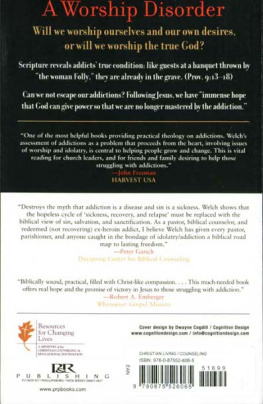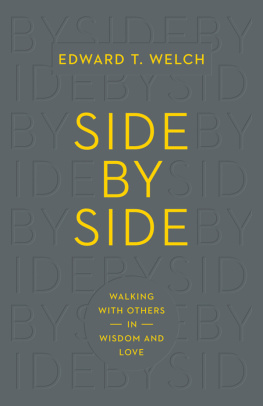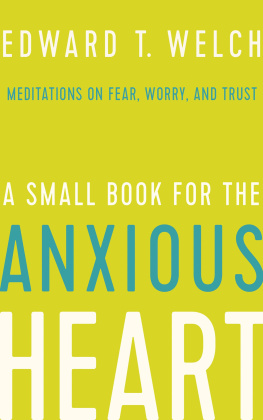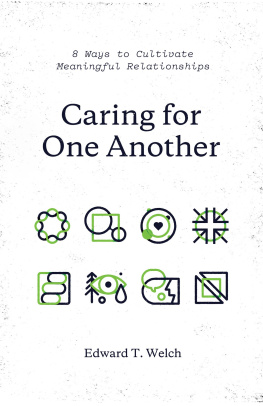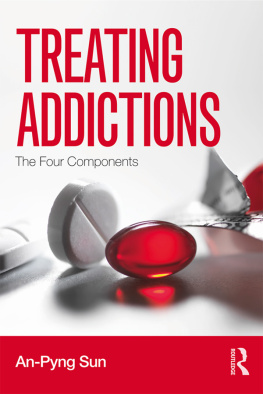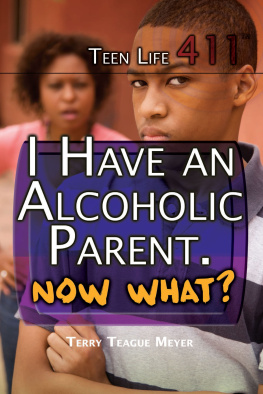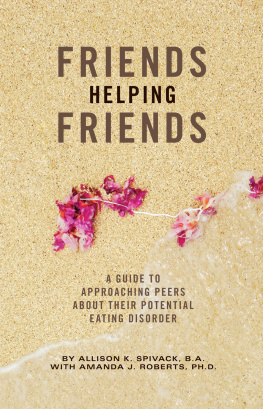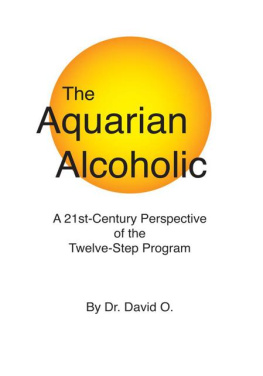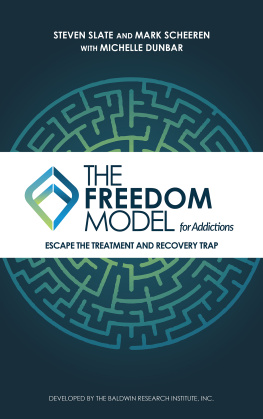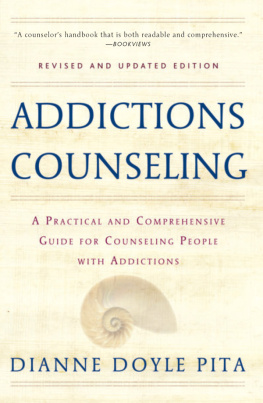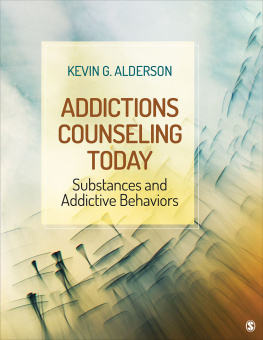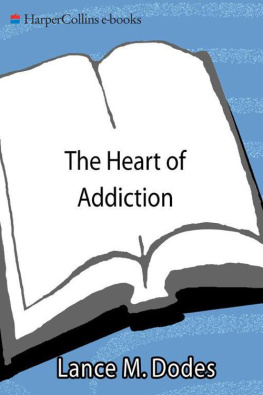
Resources for Changing Lives
A series published in cooperation with
THE CHRISTIAN COUNSELING AND EDUCATIONAL FOUNDATION
Glenside, Pennsylvania
Susan Lutz, Series Editor
Available in the series:
Edward T. Welch, When People Are Big and God Is Small: Overcoming Peer Pressure, Codependency, and the Fear of Man
Paul David Tripp, Age of Opportunity: A Biblical Guide to Parenting Teens
Edward T. Welch, Blame It on the Brain? Distinguishing Chemical Imbalances, Brain Disorders, and Disobedience
James C. Petty, Step by Step: Divine Guidance for Ordinary Christians
Paul David Tripp, War of Words: Getting to the Heart of Your Communication Struggles
Edward T. Welch, AddictionsA Banquet in the Grave: Finding Hope in the Power of the Gospel
Paul David Tripp, Instruments in the Redeemers Hands: People in Need of Change Helping People in Need of Change
David Powlison, Seeing with New Eyes: Counseling and the Human Condition through the Lens of Scripture
ADDICTIONS
A Banquet in the Grave
Finding Hope in the Power of the Gospel
EDWARD T. WELCH
Addictions A Banquet in the Grave: Finding Hope in the Power of the Gospel
Copyright 2001, 2011 by Edward T. Welch.
E-Book Published 2011 by New Growth Press, Greensboro, NC 27404.
All electronic rights reserved.
Previous published in print by P&R Publishing Company, Phillipsburg, NJ 08865.
ISBN 13: 978-1-936768-13-4
ISBN 10: 1-936768-13-5
All Scripture Quotations, unless otherwise indicated, are taken from the Holy Bible New International Version. NIV. Copyright 1973, 1978, 1984 by International Bible Society. Used by permission of Zondervan. All rights reserved.
To Ben Ferris,
a wise and insightful co-worker
Bound as I was, not with another mans irons, but by
my own iron will. My will the enemy held, and thence
had made a chain for me, and bound me. For of a
froward will, was lust made; and a lust served, became
custom; and custom not registered became necessity. By
which links, as it were, joined together (whence I called
it a chain) a hard bondage held me enthralled.
Augustine, Confessions, Book 8
Illustrations
Figures
Tables
Acknowledgments
At this point in my life, I know I am simply writing down other peoples ideas, most of which my poor memory prevents me from citing. But there are some contributors I remember well. John Bettler, David Powlison, Winston Smith, and Paul Trippmy colleagues at CCEFcontinue to be chief catalysts, instructors, and examples. They teach me that attentiveness to biblical doctrine and a life of love are inseparable.
To write this book, I was freed from my regular duties at CCEF through the generous and sacrificial support of Dee Miller, a person who has a vision for biblical counseling. This persons financial support and godly life have blessed me in many ways.
Sue Lutz is listed as Series Editor, but behind this title is a job description that includes theologian, practitioner, coach, friend, and pages more. She has been devoted to bringing out the best in me. Thank you.
When you spend time with people who have struggled with addictions, they all change you in some way. The men and women I have known have often caused me to grieve, but they have also reminded me that the triune God loves addicts and delights in setting them free. I have valued my time with them immensely.
My wife, Sharon, has a hand in everything I do. This project is no exception.
Preface
There is an accepted tradition among those who struggle with addictions that goes something like this: helping yourself will help others, and helping others will help yourself. If an alcoholic learns to take his soul to task, it will bless family, friends, co-workers, and probably many others. If that same alcoholic looks out for the needs of others, and goes out of his or her way to serve another drinker, then that person will most certainly be blessed in some way. With this in mind, the material that follows will examine both ourselves and those we want to help. It might seem awkward to think about our own struggles in one paragraph and then focus on other people in the next, but in a book that considers the human heart and the Christ of Scripture, there can be no other way. Preachers must preach to themselves before they preach to others. Counselors are always counselees.
You will probably come to this book with a particular role in mind. For example, I came with the idea of helping others. But as I dug into Scriptures teaching on the reckless nature of the human heart and its rich teaching on self-control, it made me see that I needed help as well. So thinking about your own struggles is the best way to start. Be sure to look for addictions in your own heart and life. Even though the focus of this book will be primarily on drugs and alcoholprototypic addictionsthe basic ideas are relevant to all kinds of sins that are not easily cast off. (Are there any that are?) Look for the activities or substances that entice you, leaving you wanting to come back for more, even though more may not be wise, godly, or legal. Look especially at the activities that provide you with a fairly rapid bodily experience. Scripture targets sex, alcohol, and food, but there are others.
What is the basic point of this book? Theology makes a difference. It is the infrastructure of our lives. Build it poorly and the building will eventually collapse in ruins. Build it well and you will be prepared for anything. The basic theology for addictions is that the root problem goes deeper than our genetic makeup. Addictions are ultimately a disorder of worship. Will we worship ourselves and our own desires or will we worship the true God? Through this lens, all Scripture comes alive for the addict. No longer are there just a few proof texts about drunkenness. Instead, since all Scripture addresses our fundamental disorder of worship, all Scripture is rich with application for the addict.
What follows will, I hope, seem radical. Rightly understood, Scripture should always seem radical, leaving us amazed and a bit off-balance. But a Christ-centered perspective on addictions should definitely be revolutionary. We are living in a culture where the theory and language of addictions are presently controlled by secular categories. Words like disease, treatment, and even addiction convey the idea that these problems have their ultimate cause in the body rather than the soula commonly accepted view that is at odds with clear biblical teaching. Given the domination of this secular perspective, careful biblical inspection will most likely reveal many layers of error in our thinking about addictions that will take years, and the insights of many people, to uncover. Thinking biblically about these difficult problems will require much more than redefining words or making Jesus the higher power. Instead, everything must be open to biblical inspection. Since we live in a culture that assumes a sub-biblical position, we must realize that it affects us more than we think.
For those who have been keeping track of cultural trends, what follows might not seem that radical. There are more and more probing and insightful voicessecular and Christian that are questioning the legitimacy of current views on addiction. So this book is certainly not alone. I hope, however, that it can contribute wisdom and practical help to this very important area of debate and spiritual struggle.
Next page
